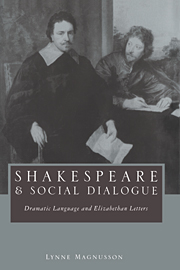Book contents
- Frontmatter
- Contents
- Acknowledgments
- Introduction
- Part 1 THE RHETORIC OF POLITENESS
- Chapter 1 Politeness and dramatic character in Henry VIII
- Chapter 2 “Power to hurt”: language and service in Sidney household letters and Shakespeare's sonnets
- Part II ELOQUENT RELATIONS IN LETTERS
- Part III A PROSAICS OF CONVERSATION
- Notes
- Bibliography
- Index
Chapter 1 - Politeness and dramatic character in Henry VIII
Published online by Cambridge University Press: 22 September 2009
- Frontmatter
- Contents
- Acknowledgments
- Introduction
- Part 1 THE RHETORIC OF POLITENESS
- Chapter 1 Politeness and dramatic character in Henry VIII
- Chapter 2 “Power to hurt”: language and service in Sidney household letters and Shakespeare's sonnets
- Part II ELOQUENT RELATIONS IN LETTERS
- Part III A PROSAICS OF CONVERSATION
- Notes
- Bibliography
- Index
Summary
In Henry VIII, when the class-conscious Duke of Buckingham, conversing with the Duke of Norfolk and the Lord Abergavenny, becomes increasingly heated in his criticisms of the upstart Cardinal Wolsey, Norfolk offers this advice:
I advise you
(And take it from a heart that wishes towards you
Honor and plenteous safety) that you read
The cardinal's malice and his potency
Together; to consider further, that
What his high hatred would effect wants not
A minister in his power.
(1.1.102–08)In the construction of Norfolk's speech, two features of the language may be said to serve reparative functions, undoing deficiencies of the utterance-in-the-making. One such feature is restatement: the final that clause restates the preceding that clause, compensating with redundancy for the “high communication loss” associated with oral delivery in a theatre setting. The second instance of repair work, which occurs in the parenthesis, is motivated not by a desire for clarification but for social maintenance. A recent account of the social logic of civil conversation, developed by anthropologists Penelope Brown and Stephen Levinson, can help to characterize the work of social maintenance accomplished here. Brown and Levinson argue that the most commonplace speech acts negotiated in everyday conversation – advising, promising, inviting, requesting, ordering, criticizing, even complimenting – carry an element of risk, for they threaten potential damage to the persona of either hearer or speaker (or to those of both).
- Type
- Chapter
- Information
- Shakespeare and Social DialogueDramatic Language and Elizabethan Letters, pp. 17 - 34Publisher: Cambridge University PressPrint publication year: 1999



